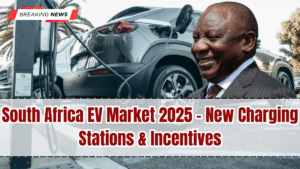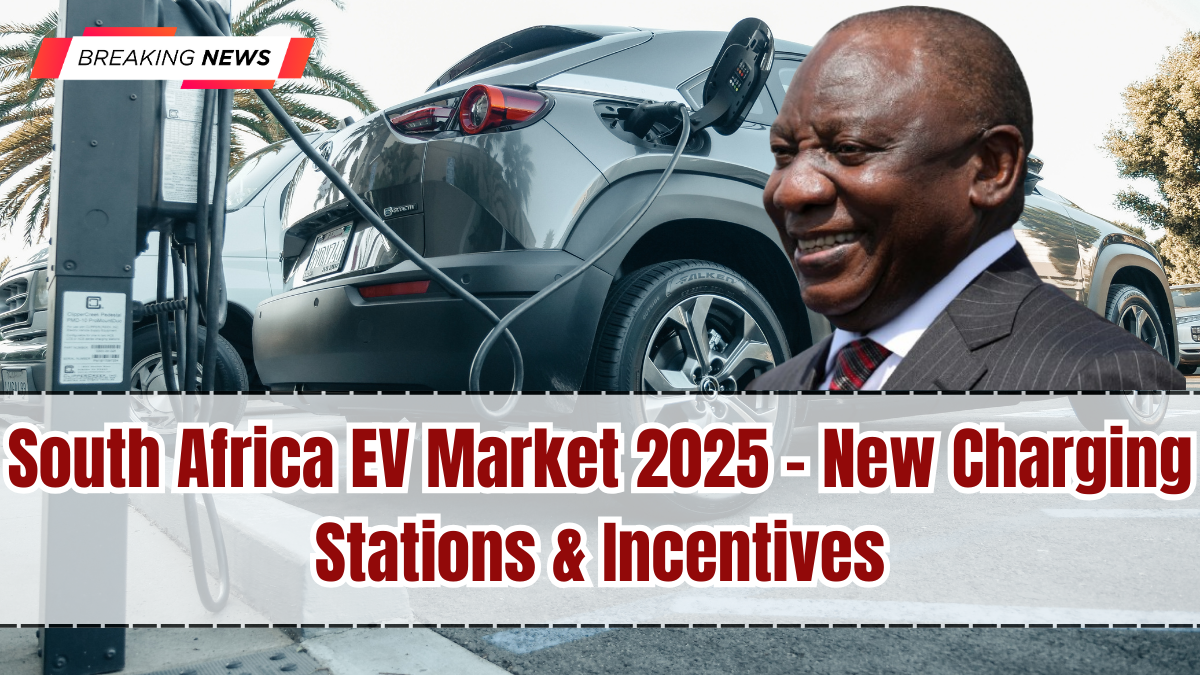The South Africa EV Market 2025 is shifting gears fast. What was once seen as a niche choice for wealthy buyers is now moving into the mainstream.
With new charging stations being installed across major cities and highways, plus incentives from both government and private players, South Africans are finally warming up to electric mobility.
But what’s fueling this sudden growth, how many stations are now available, and which models are leading the EV wave in 2025? Let’s explore.

How Many Charging Stations Are There in 2025?
By mid-2025, South Africa has rolled out more than 1,200 public charging stations nationwide.
-
Gauteng: The province leads with hubs in Johannesburg and Pretoria.
-
Cape Town: Expanding fast with chargers in malls, office parks, and tourist hotspots.
-
Durban & KwaZulu-Natal: Growing steadily, especially along highways.
Fast-charging stations on long-distance routes like the N1 and N3 now make intercity EV travel far more practical than before.
What Types of Chargers Are Available?
South Africa’s EV network includes different charging options for different needs.
-
AC Chargers (7–22kW): Ideal for home and workplace charging.
-
DC Fast Chargers (50–150kW): Common at malls and rest stops, charging most EVs in under an hour.
-
Ultra-Fast Chargers (up to 350kW): Limited but expanding in urban hubs, supporting high-end EVs.
This mix ensures that EVs can fit into both daily commutes and long journeys.
What Incentives Are Driving EV Adoption?
The government and private sector are both pushing hard.
-
Tax Incentives: Import duties reduced on selected EVs.
-
Subsidies: Rebates offered to early adopters in Gauteng and Cape Town.
-
Company Fleet Discounts: Businesses switching to EV fleets enjoy tax breaks.
-
Green Energy Push: Some municipalities provide lower electricity tariffs for EV charging at night.
These perks are helping narrow the price gap between EVs and traditional petrol cars.
Which EV Models Are Popular in South Africa?
Several models are gaining traction with South African buyers.
-
Affordable Options: BYD Dolphin, GWM Ora, Nissan Leaf.
-
Mid-Range EVs: Hyundai Kona EV, Kia EV6, MG4 Electric.
-
Premium Models: Tesla Model 3, BMW iX, Porsche Taycan.
The BYD Dolphin and GWM Ora stand out as best-sellers due to their affordability and efficiency.
Are Businesses and Fleets Making the Switch?
Yes. Delivery companies, taxi operators, and even government fleets are adopting EVs.
-
Logistics: Firms are testing electric vans to cut fuel costs.
-
Ride-Hailing: Uber and Bolt drivers are joining pilot EV programs in Johannesburg.
-
Public Transport: Electric buses are being tested in Cape Town and Pretoria.
This commercial adoption is expected to accelerate the market even faster.
What Challenges Still Hold EVs Back?
Despite growth, challenges remain.
-
High Purchase Prices: Even with incentives, EVs remain more expensive than petrol cars.
-
Limited Rural Infrastructure: Charging stations are still concentrated in big cities.
-
Battery Concerns: Drivers worry about lifespan, replacement costs, and recycling.
These hurdles mean EV adoption is faster in urban areas but slower in rural regions.
How Do EVs Compare With Petrol Cars in Daily Costs?
Running costs are where EVs shine.
-
Electricity vs Petrol: Charging an EV costs 50–60% less than filling up with petrol.
-
Maintenance Savings: EVs have fewer moving parts, lowering annual servicing costs.
-
Road Taxes: Discounts and exemptions are being tested for EV owners in some provinces.
For high-mileage drivers, these savings add up to thousands of rand per year.
What Role Does Renewable Energy Play?
South Africa’s push for solar and wind power ties directly into EV adoption.
Charging stations are increasingly powered by renewable energy, reducing carbon footprints. Homeowners with solar panels are also installing EV chargers, making charging almost free during the day.
This integration strengthens both the EV and renewable energy sectors at the same time.
Will EV Adoption Keep Growing Beyond 2025?
Yes. Market analysts expect EV sales to triple by 2030.
As more affordable models arrive and charging infrastructure spreads into smaller towns, adoption will move beyond wealthy urban buyers. Government fleet targets and stricter emission rules will also accelerate demand.
By the end of 2025 alone, EVs are expected to make up 5–7% of new car sales in South Africa, up from just 2% in 2024.
Conclusion
The South Africa EV Market 2025 is no longer a distant dream—it’s happening now. With over 1,200 charging stations, growing tax incentives, and popular affordable models, electric mobility is finally becoming mainstream.
Challenges like high upfront costs and rural infrastructure gaps remain, but the benefits of lower running costs, government support, and environmental responsibility are too strong to ignore.
For South Africans, the road ahead is clear: the shift to electric cars is already here, and it’s only going to accelerate.
FAQs
How many charging stations are in South Africa in 2025?
Over 1,200 public charging stations are now available nationwide.
What incentives are available for EV buyers?
Reduced import duties, rebates, and lower electricity tariffs for charging.
Which EV models are most popular?
Affordable models like the BYD Dolphin and GWM Ora, plus premium options like the Tesla Model 3.
Are businesses adopting EVs too?
Yes. Logistics firms, ride-hailing drivers, and even public bus operators are testing EV fleets.
Is charging cheaper than petrol?
Yes. Charging an EV costs 50–60% less than refueling with petrol, plus lower maintenance costs.
Click here to know more.
